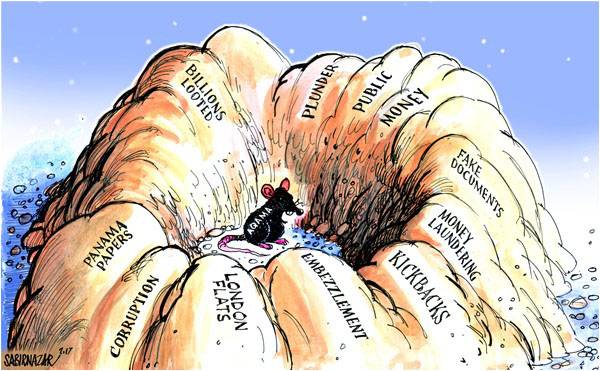
Panama verdict
Sir,
The Prime Minister of Pakistan could have stepped down, but he did not. The JIT worked to bring proof and its efforts must be lauded. The PM enlisted the services of highly qualified professionals as well. Having said that, the family failed to render any evidence to ascertain their innocence, in my opinion. Every day his supporters used to defend him with great perseverance in public and on social media. But some documents provided by his sons and relatives were ostensibly forged and did not carry weight. The decision of the honourable Supreme Court has made history. Transgressors must be brought to book in light of the SC orders.
There is a dire need to bring reforms to the electoral process as well in order to get rid of this scourge. This current political system must be replaced by a transparent one.
Haider Ali,
Lahore.
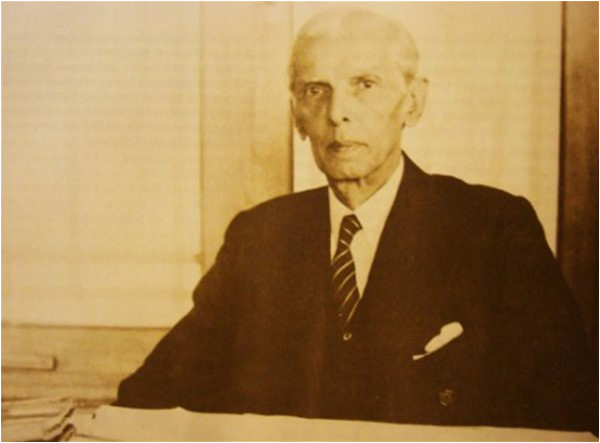
Freedom of religion
Sir,
John Stuart Mill, a English philosopher, stated in his famous book “On Liberty” that “the great writers to whom the world owes what religious liberty it possesses, have mostly asserted freedom of conscience as an indefeasible right, and denied absolutely that a human being is accountable to others for his religious belief. Yet so natural to mankind is intolerance in whatever they really care about, that religious freedom has hardly anywhere been practically realized, except where religious indifference, which dislikes to have its peace disturbed by theologically quarrels, has added its weight to the scale.”
The freedom of religion and conscience has been protected in several treaties and declarations. Article 18 of the United Nations Covenant on Civil and Political Rights, 1966 provides that every person shall have the right to freedom of thought, conscience and religion. This right shall include freedom to have or adopt a religion or belief of his choice, and freedom, either individually or in community with others and in public or private, to manifest his religion or belief or belief in worship, observance, practice and teaching.
Religion has played an important role in human history, and faith has influenced the minds and actions of individuals, societies and nations down the ages. The freedom of religion must then be construed liberally to include freedom of conscience, thought, expression, belief and faith. Freedom, individual autonomy and rationality characterize liberal democracies and the individual freedoms thus flowing from the freedom of religion must not be curtailed by attributing an interpretation of the right to religious belief and practice exclusively as a community-based freedom.
The protection of the freedom of religious belief and practice of all communities was indeed the predominant right asserted in several propositions and resolutions passed by the All India Muslim League. One of the famous Fourteen Points enumerated by Mohammad Ali Jinnah on proposed constitutional changes was “full religious liberty, i.e. liberty of belief, worship and observance, propaganda, association and education shall be guaranteed to all communities.” Thus the very genesis of Pakistan is grounded in the protection of the religious rights of all, especially those of minorities.
The right to religious conscience being a fundamental right is not subject to any other provision of the Constitution, it is only subject to law, public order and morality and not to any religious clauses of the Constitution of Pakistan. The very terms law, public order and morality have been used in non-religious terms as the notion of law or public order or morality is not reducible to the Islamic meanings of these terms. There is a general lack of awareness in Pakistan about minority rights, among the people and those entrusted with enforcement of law are also not fully sensitized to this issue either. It needs to be reiterated that under the Constitution of Pakistan 1973, minorities have a special status. Of all the Articles relating to minorities’ rights, Article 20 is of prime significance. It would be counter intuitive if the right to freedom of religion enshrined in Article 20 is interpreted in the manner which has the effect of encroaching upon religious freedoms of minority religions in Pakistan. As per Article 251 of the constitution, any section of citizens having a distinct language, script or culture shall have the right to preserve and promote the same and subject to law, establish institutions for that purpose.
Article 20 does not merely confer a private right to profess but confers a right to practice both privately and publicly. Besides, it confers the additional right not only to profess and practice religion but also to have the right to propagate religion to others. The State shall safeguard the legitimate rights and interests of minorities and the ultimate goal of the state should be to eradicate religious intolerance in Pakistan.
Arsalan Raja,
Lawyer,
Karachi.
Internet for Turbat
Sir,
The internet is a necessity but while many parts of Pakistan are connected, there are many which are not and even if PTCL options are available students can’t afford them. We used to have 4G and Evo, but both are now not available. Recently the Punjab Government announced free internet for its students, but in Turbat we don’t even have access. I request the CM of Balochistan and the authorities to provide us the internet so we can study.
Zubair Nizar,
Via email.
China at Doklam

Sir,
The UN should take cognizance of the military standoff between India and China which has the potential of plunging about 3.1 billion people in a fight-to-finish war. Militant jihadis are bound to see great benefit in an Indo-China war. The US should stop its ally India from precipitating a war between three nuclear countries. Furthermore, Pakistan will be glad if India does not withdraw from Doklam as it will make China intervene militarily in Kashmir.
We Indians have been given to understand by the Indian media (through various commentators and even a live telecast of Parliamentary proceedings) that India is under obligation to protect Bhutan militarily—and not only for protecting Indian security interests. On the invitation of Bhutan the military of India has gone to Doklam (a disputed territory between China and Bhutan) where there has been a military standoff for the last about one and half months. These impressions have been given by India; some of them are:
It is the Bhutanese after all who are contending with the Chinese over the area and it is they who invited the Indians to take up cudgels on their behalf against the Chinese. The present standoff between Indian and Chinese troops in Doka La (Doklam) is a rare insight into New Delhi’s very special relationship with Bhutan, which includes military responsibilities towards it. Hence, we Indians are incensed over the media-projected aggression of China and present day jingoist India is prepared to even go to all-out and full-fledged war against China (also to settle the score with China about India’s humiliating and crushing defeat in the 1962 Indo-China war).
But on a program (Latitude) on a prominent TV channel (TimesNow) one reputed panelist said that neither is there any treaty between India and Bhutan which automatically entitles India to assume the responsibility of the defense of Bhutan from external aggression nor did Bhutan invite India to take on China militarily at Doklam (where Chins is constructing a road).
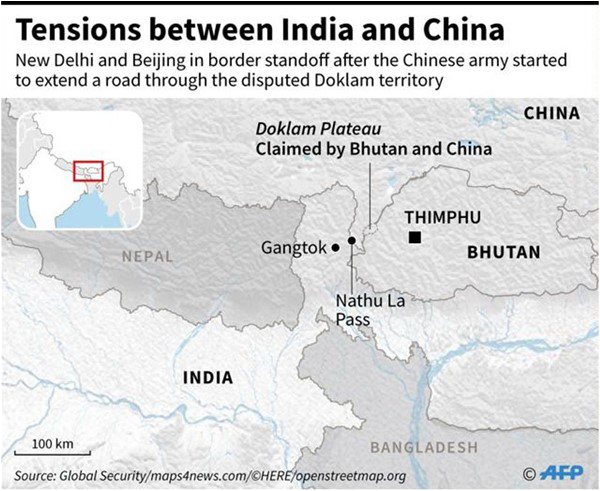
As far the absence of any such treaty is concerned, the panelist seems to be right because the treaty of 2007 has changed the sort-of-protectorate provision of the 1949 treaty between India and Bhutan as given below:
1949 Treaty Article 2, which says that: The Government of India undertakes to exercise no interference in the internal administration of Bhutan. On its part the Government of Bhutan agrees to be guided by the advice of the Government of India in regard to its external relations.
2007 Treaty Article 2, which says that: In keeping with the abiding ties of close friendship and cooperation between Bhutan and India, the Government of the Kingdom of Bhutan and the Government of the Republic of India shall cooperate closely with each other on issues relating to their national interests. Neither Government shall allow the use of its territory for activities harmful to the national security and interest of the other.
As far an invitation by Bhutan to India to intervene militarily in the dispute between China and Bhutan, the websites of the governments of India and Bhutan are silent on this issue. Meanwhile, China has already threatened that if India as a third country can intervene on the side of Bhutan in a territorial dispute between China and Bhutan then China also as a third country can intervene militarily on the side of Pakistan in the territorial dispute between India and Pakistan (about J&K).
The Indian argument is legally untenable that it has gone to Doklam for its own security because of the construction of a road by China at Doklam will be a danger to Chicken’s Neck (the Siliguri corridor). There are many such Chicken’s Necks all over the world and the countries with them manage their defense commensurate with such geographical realities. Every country for its defense is legally expected to remain on its territory and should not object if other countries do anything on their territory for their defense. Hence if India was not invited by Bhutan to come to Doklam (the territory of either Bhutan or China which will be decided after their dispute resolution) under a legally valid treaty then India has no business to create a war-like situation with China which has a potential of risking the lives of about 3.1 billion people of this region.
It hardly needs any mention that Pakistan would be happy to have China on its side militarily in any Indo-Pak war for the resolution of the Kashmir dispute (which has been pending in the UN and which has already caused four wars between India and Pakistan namely 1947-48, 1965, 1971, during Kargil and a proxy war). Pakistan is likely to also leave no stone unturned to ensure that China does so at the earliest especially given the fact that Pakistan sees Kashmiris as immensely alienated from India (after the July 2016 killing of Burhan Wani and increased unrest in the valley).
This explosive situation has one more dangerous aspect to it. China has been claiming the State of Arunachal Pradesh in northeast India (which has seven other states).
This has brought the 3.1 billion people of China, India and Pakistan (even Bangladesh) face-to-face with the danger of total extinction in a war between three nuclear countries China, India and Pakistan.
Therefore, the UN should immediately ask its member Bhutan whether it invited India militarily against China at Doklam and if yes, then under which treaty? If Bhutan answers both the questions in the negative then the UN should move to promptly discipline India by asking it to pull its Army out from Doklam so that war can be avoided.
After PM Modi’s visit to the US, through a joint statement, the US has roped in India as its ally to counter China in the South China Sea (where China, as per the US, is denying free navigation rights to other countries). Therefore it is also the responsibility of the US (as a veto-wielding permanent member of the UN) to stop its ally from unnecessarily precipitating a war.
Hem Raj Jain,
Author of ‘Betrayal of Americanism’
Bengaluru, India.
Please step down
Sir,
There is a saying: “Some people are born great, some acquire greatness, some have greatness thrust upon them.” So now it is time for PM Nawaz Sharif to prove that greatness was not thrust upon him after the JIT final report.
Keeping with democratic tradition and norms and practices followed by all democratic leaders all over the globe, he must step down for the time. Such a move would make him taller in the eyes of democratic forces. We have before us the example of Zulfikar Ali Bhutto who preferred to go to the gallows instead of opting for a mercy petition before a dictator or to compromise by submitting some statement as was the wish of the military dictator.
Nawaz Sharif himself demanded the resignation of PM Yousuf Raza Gilani when a case of contempt of court was being heard. And without an iota of doubt, NS was justified in his demand.
Aristotle said that he counted as brave the man who overcame his desires rather than one who overcame his enemies. By stepping down, the PM will show that he is brave and his resignation will strengthen democratic institutions and his political enemies will face a crushing defeat.
The verdict of history is always true, resolute and constant. Honour, power, money are all worldly things; they vanish and all that is left is your name in history.
Aamir Aqil,
Lahore.
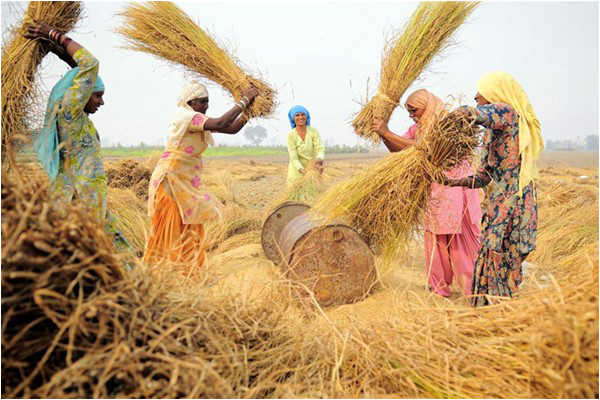
Food supply
Sir,
It is nearly possible that by 2050 world population will reach ten billion. On the other hand, the process of producing grain from agricultural land is still traditional, and we urgently need to speed it up because the lack of a food supply will spread hunger.
Experts says that population growth continues, but our land mass about (24,000 sqkm) to produce food, which is not enough already, will go down as cities are growing.
At this time one in every nine people is deprived of a proper supply food. Scientists also say that one reason we are not producing enough food is that the land’s fertility is going down. Social experts say that it is impossible to stop population growth.
Social experts also believe that the real problem is food delivery systems. According to these specialists, a lot of food is wasted in the developed world. Agricultural scientists say that environmental changes are rendering much land uncultivable. One of the main reasons is a lack of water water and salination.
Abdul Rehman.
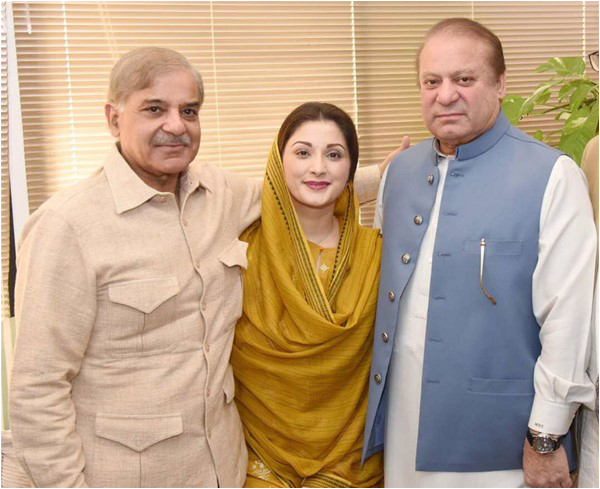
JIT heroes
Sir,
I am a non-political person. However, I very well know the politics of our country and the levels of corruption in it. In such a situation, I am honestly of the view that the members of the Joint Investigation Team, mandated by the Supreme Court to investigate aspects of the wealth of the prime minister and his family, have done a very professional job.
They remained united in the best interest of the country and served the nation, unconditionally without making any kind of compromise. They did a challenging and risky work and delivered. This is the spirit we all need.
I think this is the beginning of a new era and we must all be thankful to God that we were able to see this day. We hope, sooner or later, a strong and speedy accountability process will be started from the top without any discrimination and without making any exception to make the country as it was the dream of Quaid-e-Azam Mohammad Ali Jinnah. The team members of the JIT must be considered our national heroes as they faced their challenge patiently and calmly and assisted the bench of the Supreme Court in giving its verdict with confidence and truly on merit.
Khalid Mustafa,
Advocate,
Islamabad.

